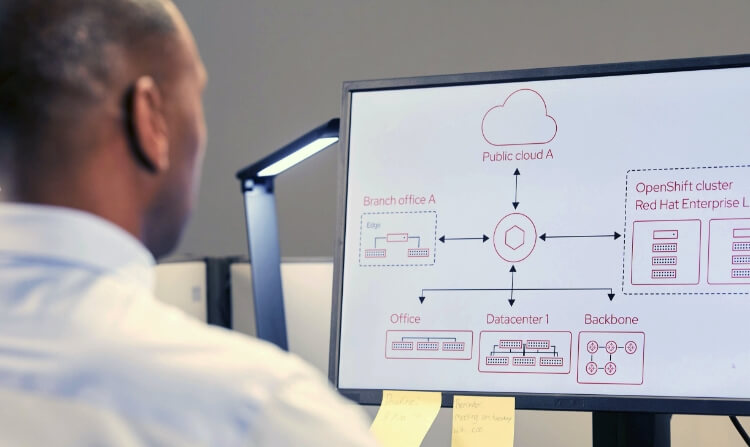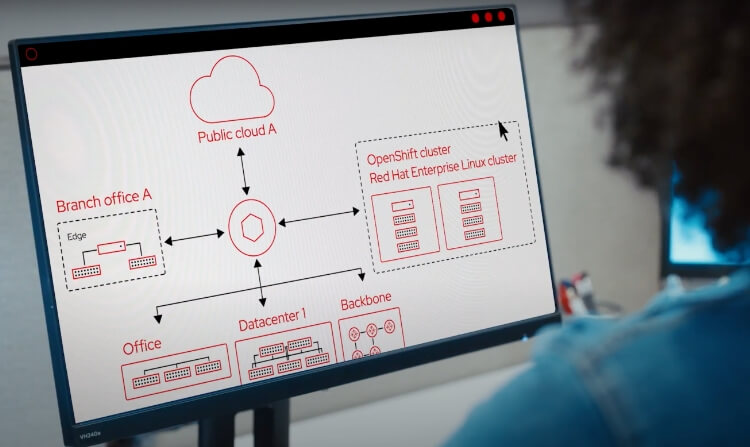Red Hat Ansible Automation Platform features and benefits
Teams need a single automation solution that spans where automation lives. Red Hat® Ansible® Automation Platform makes it easy to share automation across teams. It provides everything you need to create, execute, and manage automation—with a single subscription.
Who uses Ansible Automation Platform?
Automation teams need to quickly provide reliable automation when and where the business needs it. In many organizations, automation is not managed by a single person or team—some operations team members may serve in multiple roles.
Automation architects
Automation architects elevate automation across teams to align with IT processes and streamline adoption. IT managers and architects can more easily expand automation across the enterprise, while managing automation policy and governance with automation services catalog. They also benefit from real-time reporting across the entire stack with automation analytics and Red Hat Insights for Ansible Automation Platform.
Automation developers
Automation developers create Ansible playbooks, roles, and modules. Developers retain the freedom to build, without the operational overhead of maintaining many tools and frameworks. Automation execution environments deliver a consistent container-like experience for building and scaling automation, with new tooling included to help build and manage the container images. There are more than 140 Red Hat Ansible Certified Content Collections across 60+ partners. These collections offer prebuilt, fully supported, certified automation content, with solutions available for nearly every use case.
Automation admins and operations teams
Automation admins and operations teams ensure the automation platform and framework are operational. They have powerful tools in automation controller and Ansible automation hub to manage and share automation projects more efficiently, with a common language and a broadly accessible mix of command line interfaces (CLIs), graphical user interfaces (GUIs), and text-based user interfaces (TUI) across endpoints.
Product features
Ansible Lightspeed
Use AI to generate code recommendations for automation tasks
Red Hat Ansible Lightspeed with IBM watsonx Code Assistant is a generative AI tool that helps automation teams learn, create, and maintain Ansible Automation Platform content more efficiently. It accepts prompts entered by a user and then interacts with IBM watsonx foundation models to produce code recommendations built on Ansible best practices—helping you convert subject matter expertise into trusted, reliable Ansible code that scales across teams and domains.
Event-Driven Ansible
Reduce manual tasks with event-driven automation
Event-Driven Ansible allows teams to automate IT tasks with user-defined, rule-based constructs. It works by receiving events from third-party tools, deciding on the actions to take, and responding automatically.
Using Event-Driven Ansible, domain experts can create end-to-end, fully automated scenarios for a broad array of use cases across the IT landscape. By automating high-volume routine tasks, teams can spend more time focusing on the work that matters most, while performing IT actions consistently and accurately at scale.
Automation execution environments
Defined, consistent, and portable
An automation execution environment is a container image that provides a defined, consistent, and portable environment for executing Ansible Playbooks.
These container images ensure that automation runs consistently across multiple platforms. All custom dependencies are defined at the development phase and are no longer tightly coupled to the control plane, resulting in faster development cycles, scalability, reliability, and portability across environments.
Automation execution environments also standardize your automation efforts by lowering complexity and reducing the risk of drift between development and production.
Automation controller
Define, operate, and delegate automation
Automation controller is the control plane for Ansible Automation Platform, defining, operating, and delegating automation across your organization. It includes a user interface, role-based access control (RBAC), a workflow visualizer, and continuous integration and continuous delivery (CI/CD) integrations to help organizations standardize and scale automation while reducing automation sprawl and variance.
With automation controller, users can manage inventory, launch and schedule workflows, track changes, and integrate those changes into reporting—all from a centralized user interface and REST API.
Automation mesh
Scale automation across environments
Automation mesh provides a simple and reliable framework for scaling automation across diverse network topologies, platforms, and teams—all centrally managed via automation controller. By providing a flexible, multidirectional communication layer, automation mesh enhances an organization’s ability to operate at a global scale.
With automation mesh, you can localize automation and execute it closer to endpoint devices—and limit execution interruptions that can cause inconsistent states and downtime.
Ansible Content Collections
Accelerate automation with prepackaged content
An Ansible Content Collection is a standardized format for organizing bundles of modules, playbooks, plugins, roles, and documentation from Red Hat and our partners. Ansible Content Collections include Red Hat Ansible Certified Content and Ansible validated content. Users can access, reuse, and share collections across their organizations, while content creators can develop and share new collections without waiting for the next Ansible Automation Platform release.
Red Hat Ansible Certified Content and Ansible validated content are available through Ansible automation hub and private automation hub—an on-premise repository that allows organizations to manage, share, and curate content internally.
Ansible automation hub
Modules, roles, plugins, and documentation
Ansible automation hub is the central repository to find, use, and manage Ansible Content Collections, which are included as part of your Ansible Automation Platform subscription to help teams automate faster. The collections come with content—like modules, roles, and plugins—and the documentation you’ll need to get started.
Ansible Automation hub allows you to locate new collections quickly, reuse and share content throughout your organization, create custom repositories for internal teams, and manage a combination of internally generated content, Red Hat Ansible Certified Content, and Ansible validated content.
Automation analytics and Red Hat Insights
Track and manage automation with rich reporting and observability metrics
Automation analytics gives you full visibility into the performance of your automation, helping you make informed, data-driven decisions so you can scale faster. Automation analytics helps you estimate return on investment (ROI), predict the time and cost savings of future automation projects, and monitor the success or failure of jobs.
With Red Hat Insights for Red Hat Ansible Automation Platform, you can monitor and proactively resolve infrastructure performance issues, system availability, and security vulnerabilities—helping to minimize compliance risks, threats, and potential downtime. Red Hat Insights relies on observability data from Red Hat support tickets and other inputs so you can identify root causes faster. You can even automate remediation with Event-Driven Ansible by using Red Hat Insights as a data source.
Ansible development tools
Create tasks, modules, and playbooks
Ansible development tools are command line utilities bundled with Ansible Automation Platform that can be used directly in the terminal. These include:
- execution environment builder: A tool to help automation developers and administrators create automation execution environments by using the dependency information defined in Ansible Content Collections by the user.
- automation content navigator: A utility that provides a command-line interface to Ansible Core and automation execution environments. Users can validate their content with easy-to-use subcommands and receive direct feedback in a clear, text-based interface.
Ansible development tools provide an enhanced, more consistent experience for Ansible Automation Platform content creators.
Ansible Automation Platform receives TrustRadius 2023 Award
Ansible Automation Platform has been awarded the TrustRadius 2023 Best Feature Set Award based on customer feedback.



